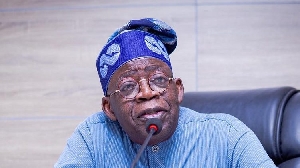 Nigeria's President Bola Tinubu
Nigeria's President Bola Tinubu
Africa, with its vast natural resources and untapped potential, has long been marred by the paradox of underdevelopment. Despite its abundance, many African nations find themselves struggling to achieve sustainable growth and prosperity.
The root causes of this predicament are multifaceted, but one fundamental aspect stands out: the critical importance of effective leadership in shaping Africa's destiny.
The renowned economist Michael Porter introduced the Diamond Model, which underscores the significance of advanced factor conditions for attaining competitive advantage. While basic factors like natural resources offer a temporary edge, sustained development hinges on factors such as a skilled workforce, a strong education system, well-developed infrastructure, and technology.
The absence of these advanced conditions in many African countries underscores the pivotal role of visionary leadership in fostering progress.
In the discourse surrounding Africa's challenges, attention often gravitates toward historical legacies such as colonial boundaries and unfair trade practices. While acknowledging their influence, it is imperative to shift focus towards proactive solutions. Herein lies the essence of leadership – a proactive, visionary approach that transcends the blame game.
President Bola Ahmed Tinubu of Nigeria exemplifies this proactive leadership paradigm. Throughout his tenure as Nigeria's president, he has demonstrated a series of qualities that extend beyond mere rhetoric, encapsulated in the following principles:
1. Influence and Dedication: President Tinubu's unparalleled ability to inspire action and dedication among his cabinet, national assembly, political appointees, and government officials stands as a cornerstone of his leadership legacy. With unwavering commitment, he cultivates a sense of purpose and urgency in addressing Nigeria's most pressing challenges.
2. Innovation and Challenging the Status Quo:
President Tinubu is a trailblazer in innovation, constantly challenging the status quo with visionary policies aimed at driving economic growth and social progress. He fosters an environment that supports innovation, recognizing its role as a catalyst for development.
organizing its role as a catalyst for development.
3. Visionary Agenda:
President Tinubu's "Renewed Hope Agenda" reflects his future-oriented vision for Nigeria. Based on practicality and foresight, and acknowledging the significance of Porter's advanced factors, this detailed plan aims to provide inclusivity and prosperity to every Nigerian. It fosters a sense of confidence and hope, setting the stage for a more promising future for the nation.
4. Compassion:
President Tinubu's compassion extends beyond rhetoric, manifesting in tangible initiatives such as student loan schemes and trade grant programs. His dedication to uplifting the most vulnerable segments of society reflects the true essence of servant leadership.
5. Courage and Decisiveness:
President Tinubu's leadership is characterized by courage and decisiveness, evident in tough decisions for Nigeria's greater good. Whether it's subsidy removal or the floating of the naira, his resolute actions reflect a steadfast commitment to economic stability and growth.
6. Effective Communication:
President Tinubu prioritizes transparent communication, articulating his plans, and rationale, and soliciting feedback from the Nigerian people. By fostering dialogue and engagement, he ensures governance remains responsive to citizens' needs and aspirations.
7. Execution and Adaptability:
President Tinubu's leadership is marked by a commitment to execution and adaptability. He follows through on plans while remaining open to necessary amendments, navigating challenges, and seizing growth opportunities.
8. Accountability:
Emphasizing accountability in governance, President Tinubu holds himself and his administration to the highest standards of performance. Quarterly ministerial appraisals exemplify his commitment to transparency and results-oriented governance.
9. Problem-Solving Aptitude:
President Tinubu demonstrates a problem-solving aptitude in addressing Nigeria's pressing issues. From insecurity to currency stability, he employs proactive measures and strategic interventions to create an enabling environment for progress and development.
10. Equity and Fairness:
President Tinubu promotes equity and fairness in governance, devoid of partisan favoritism or nepotism, ensuring that decisions are made in the best interest of all Nigerians.
As Nigeria stands on the cusp of greatness, President Bola Ahmed Tinubu's leadership offers a compelling narrative of hope and possibility for Africa as a whole. By embodying the principles of visionary leadership and transformative governance, he sets a precedent for other African leaders to follow.
President Tinubu's example catalyzes collective action and sustainable development, unlocking Nigeria's boundless potential and reaffirming its rightful place on the global stage. Indeed, other African leaders would be wise to heed the example set by President Tinubu if Africa is to march towards a future defined by prosperity, stability, and shared opportunity.